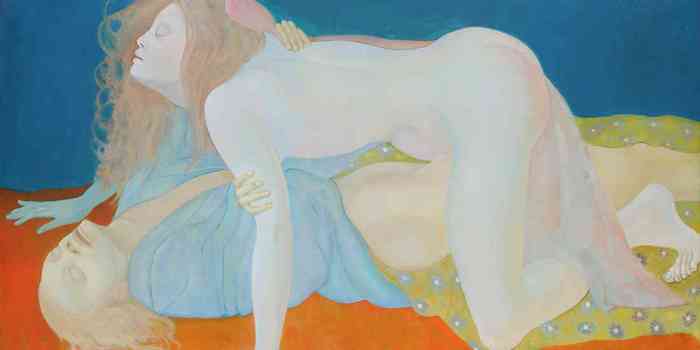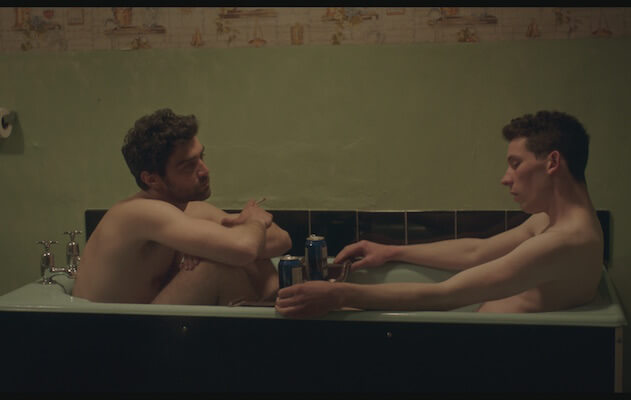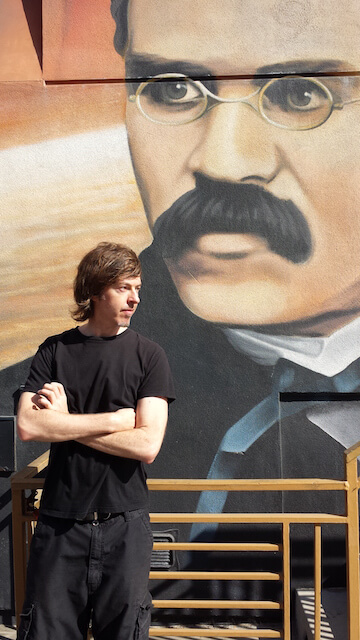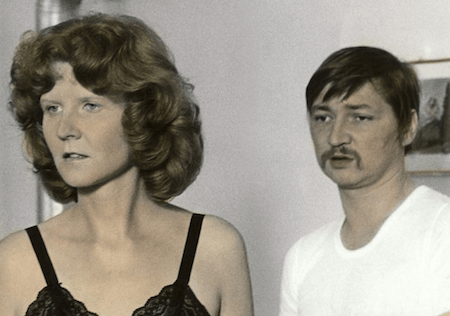Pascal Cervo and Mathieu Chevé in Jérôme Reybaud’s “4 Days in France.” | CINEMA GUILD
French filmmaker Jérôme Reybaud’s dazzling feature debut, “4 Days in France,” has Pierre (Pascal Cervo) driving off in his white Alfa Romeo, letting chance and Grindr be his guide. He has left his lover, Paul (Arthur Igual), in the middle of the night without a word. Reybaud never explains what prompts the departure, and Pierre does not reveal much as he encounters a variety of men and women on his journey. Paul, in low-key pursuit, is as determined to find Pierre as he is troubled by his lover’s absence.
Reybaud’s sensual road movie tracks these two men, both full of longing, on their parallel journeys through the gorgeous French countryside. The filmmaker chatted via Skype about gay hook-ups and making his absorbing road movie.
In “4 Days in France,” Pascal Cervo goes where Grindr and an Alfa Romeo can take him
GARY M. KRAMER: The characters in “4 Days in France” let fate and chance be their guide. How did you conceive of the film? Was it planned or randomly assembled?
JÉRÔME REYBAUD: Strangely, it became something real and complete by itself. Every character and place came by necessity and by writing the script. What I love about road movies is the narrative freedom: you leave a place and choose a place of arrival. It’s opposite of the constraints of tragedy. In road movies, all the information about the characters’ lives before they get on the road is boring. I want to hear the sound of the car engine and begin. The road has no significance other than being pretty. I wanted to make the world a real character, and not know the next move.
GMK: How did you map this road trip in terms of the locations and encounters?
JR: I live in Paris and I was born in Cannes. I drive to visit my mother five to seven times a year, so I know these landscapes in France. They are the most distinctive ones. You have the dull plains, you have the mountains, you have the volcanoes in Auvergne. I wanted to give the viewer a bunch of different landscapes. I knew the film would be long, so I wanted to escape the repetition of landscapes. Even the two sequences in the Alps are different. All the shots are real roads in the real places, so I didn’t feel I needed to twist reality to fit my script.
GMK: What can you say about the driving scenes? They are hypnotic.
JR: The size of the image of the movies is the same proportion as a windshield. If I could have made a 10-hour film of the road, I would have. I am happy to drive, put on music, and see the landscape. I wanted to recreate that. Filming the road was important. I wanted to have these long, 20-second shots of them, because they were saying what I wanted because something — the light of the day or a red or green signal —was important for the characters at that time.
There were also subjective shots from Pierre’s point of view, because he shows us the landscapes. He’s half-transparent. We see what he sees: the landscapes and the faces of the women he meets.
GMK: Can you talk about how you developed the film’s sexual elements?
JR: I think having sex with strangers can be a real philosophical, loving experience, because you give a lot more of yourself with people you don’t know and probably will never meet again. Sometimes those relations are a lot more intense because there is a complete unknown about each man.
Second, while people have said there’s not a lot of sex in the film, it’s practically a documentary about the time you spend on Grindr versus the time you spend having sex from those searches. The proportion is quite real.
Filmmaker Jérôme Reybaud. | CINEMA GUILD
GMK: Do you have a Grindr profile?
JR: I don’t have Grindr. I had to have someone help me with that. I didn’t know how it works. Personally, I’m not fond of this kind of hook-up. I’m more an old-fashioned gay, wanting to cruise or look at real men in real places. Grindr is not a place. The excitement about a hook-up is not knowing anything about someone. If I describe myself or read a profile describing a man, I’m bored, there is no discovery. The magic is when two men are meeting each other in a place and there is desire in one’s eyes.
GMK: Speaking of that, we need to discuss the mesmerizing scene of Pierre and the VRP salesman, Bertrand Nadler, having an encounter between a hotel room wall.
JR: The wall is a reference to Jean Genet’s “Un Chant d’Amour,” but I wasn’t thinking about that film. I didn’t want Pierre to have traditional sex with the salesman. It was too easy for me, a gay director, with a gay character having perfect sex. I don’t use cinema to fulfill my own fantasies, but I wanted something to happen between them sexually and a kiss was not enough.
It was more a reflection on the cheap architecture and hotels. I wanted this encounter to take place in a commercial zone and a cheap hotel. The walls are so thin and the rooms are all the same, which brought me to think of the wall and the sex scene. It’s not the sex I’m talking about, but the architecture. The cheap hotel gave me the idea. It was not easy to find this place, but after we did it was the perfect way to have a homosexual fantasize about a straight guy. The wall is there, and the sex is there at the same time.
GMK: The film is very much about losing yourself to discover what you desire. What did you learn about yourself making this film?
JR: Patience. I’m impatient in real life. But on set, having to wait for an actor or a cloud or a plane to go away, I could wait for hours.
4 DAYS IN FRANCE | Directed by Jérôme Reybaud | Cinema Guild | In French with English subtitles | Opens Aug. 4 | Quad Cinema, 34 W. 13th St. | quadcinema.com



































